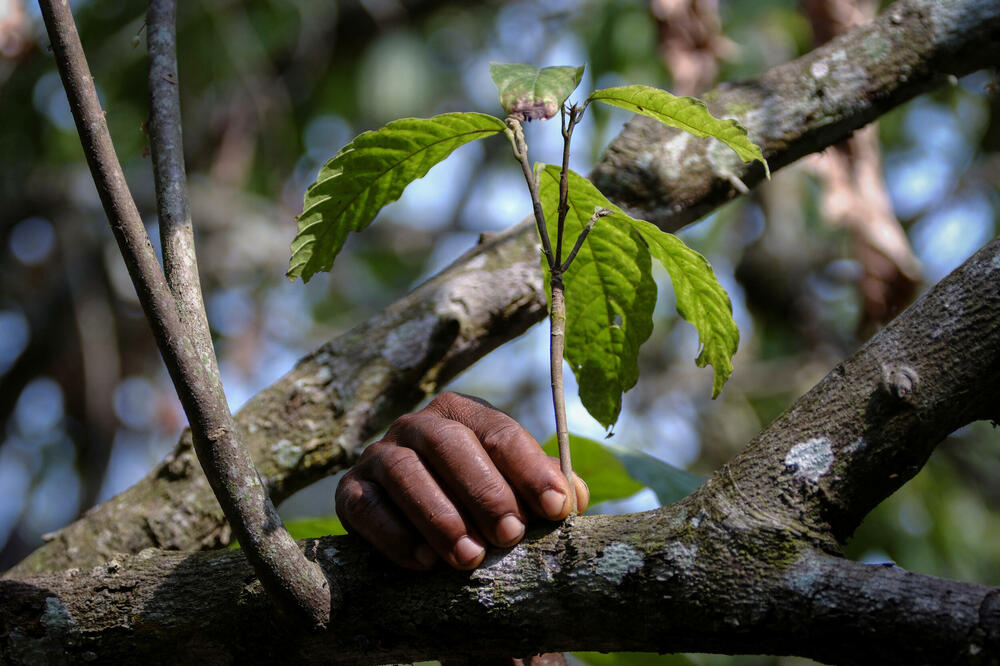Chocolate could easily become a serious luxury: cocoa prices have risen dramatically in recent months. At the same time, those who grow cocoa, the plant from which cocoa is obtained, have almost no benefit from it.
The world price of cocoa has hovered around $2.500 for years. Last fall, however, it started to grow. But that was nothing compared to this year: at the beginning of January it was already around 4.000 dollars, and now on the eve of Easter (March 28.3) it is 10.367,12 dollars for a ton of cocoa beans.
The most important reason is El Niño - but also the fact that the cultivation of cocoa trees is a relatively labor-intensive process, so that a huge part of cocoa trees on the world market comes from only two countries in West Africa. At the same time, the crop there is more than weak.
"Currently, it is estimated that the crop in Ivory Coast and Ghana is smaller by a third, and given that some 60 percent of the cocoa comes from those two countries alone, there has been a serious shortage on the world market," explains Friedel Hitz-Adams from the Zidwind Institute. in Bonn, Germany.
Given that so much cacao comes from such a limited area, it turns out that the climatic disturbance under the influence of El Niño was fatal. "In many parts of Ghana last year, first there was no rain at all, and then the heavens opened and there was so much rain that the cocoa trees stood in water for a long time, and mold and plant diseases spread over the fruits. It was catastrophic," he says. Hitch-Adams.
Deforestation is partly to blame for this, but an even bigger problem is that growers are usually so poor that they have no opportunity for any chemical preparations against plant diseases, nor for investment to improve the land.
The price is only for the future harvest
With the price suddenly quadrupling, some might think that the growers will also benefit and invest money. Far from it. In those African countries, the minimum amount of cultivated cocoa is consumed and practically everything is exported - primarily to the European Union, which is the largest consumer, or to the USA, which is in second place. Chocolate in our stores has become more expensive, but from one euro that we pay, 80 cents goes to the factory or remains with the seller, and only about seven cents reaches the cocoa tree producer.
Also, the prices on commodity exchanges do not mean that you will receive the goods on the same day: the price of the cocoa tree is also calculated for the future crop, that is the so-called Futures. Even worse for growers is that in both Ivory Coast and Ghana, a huge part, about 80 percent, is organized through central purchase at pre-agreed prices. "Tragically, farmers in Côte d'Ivoire and Ghana are not benefiting from these prices at all, because they sold their cocoa before the price started to rise," says Hitz-Adams. A German cocoa expert estimates that most of them sold it for about $1.800 per ton, and now they are in a big problem because they don't have enough cocoa beans to sell.
Expensive, more expensive...
Meanwhile, commodity exchange prices for cocoa tree shipments expected to end 2025 are still double what they were a year ago, so growers will at least benefit from that. However, major changes in the offer will not be possible in the foreseeable future: the cocoa tree needs several years until it begins to bear fruit.
The price of cocoa could certainly be affected by higher consumption in countries where it was not a tradition: "Yes, there is an increased consumption of chocolate in China and India, but even those two countries together import half as much cocoa as Germany," says Hic- Adams. "I've been hearing for fifteen years that the Chinese will soon eat a lot more chocolate, but it hasn't happened yet."
This means that there is no fear for the Easter bunny and other chocolate treats - but it is certain that the price of chocolate will rise. The price increase before Christmas was also explained by the increase in the price of raw materials, but then the producers had stocks at the old prices and that was still nothing compared to today's price of cocoa beans.
Bonus video:





